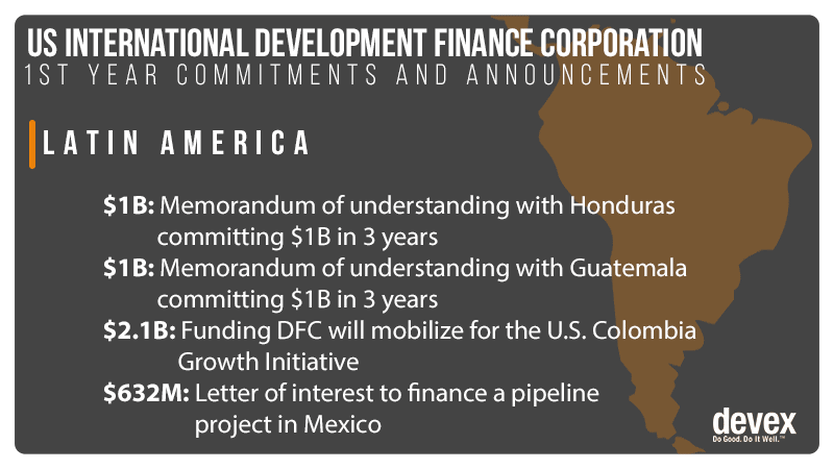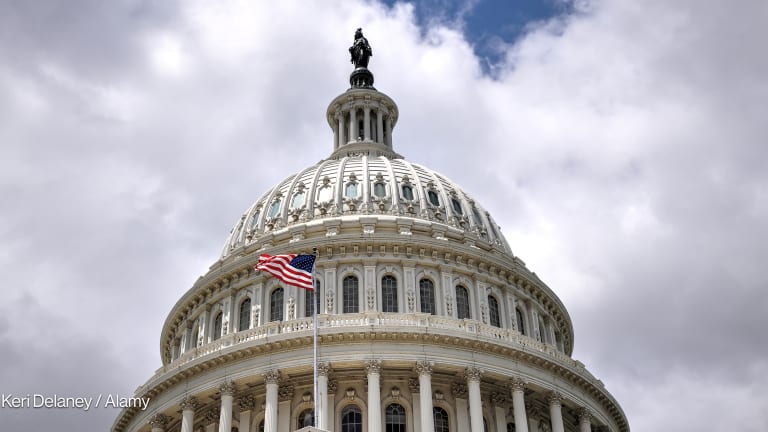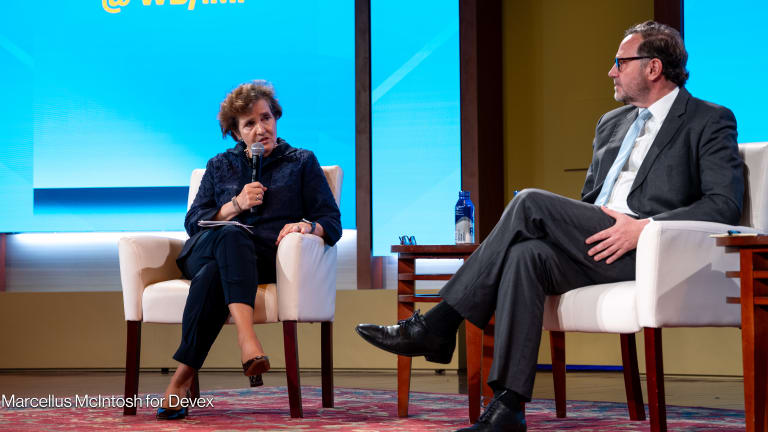
In January, in the waning days of then-President Donald Trump’s administration, the U.S. International Development Finance Corporation announced a “framework agreement” with Ecuador. Adam Boehler, DFC’s CEO at the time, took to Twitter to describe it as streamlining support for projects that get rid of “predatory Chinese debt.”
“This loan will not only help Ecuador regain sovereignty, but bring the country closer to likeminded partners,” he tweeted.
The non-binding framework, which did not include specific loans, outlined a process by which DFC would review potential future transactions in electricity, transportation, and telecommunications. About $4 billion in financing targeted at projects with a development impact could be provided through a special purpose vehicle that is backed by government-owned companies, Boehler told Devex. The agreement also requires Ecuador to use the financing to pay down its Chinese debt and exclude Chinese telecommunications services as it expands 5G mobile networks.
In an interview, Boehler called it a “prototypical deal” that carried a significant potential development impact while advancing U.S. foreign policy interests. But the framework tied to countering Chinese influence in an upper-middle-income country raised red flags for several experts who called it a questionable fit for an agency founded just a year earlier with a mandate to focus on development in low- and lower-middle-income countries.
“The alignment and use of the DFC to not just support, but in some cases to be the lead on a foreign policy objective, was more pronounced than it had ever been,” a senior development finance expert said, who requested anonymity to speak freely. “For whatever reason, the previous administration, the previous leadership, primarily Adam Boehler, was enamored with being a front-line foreign policy player pushing the agency into the breach, sometimes without consideration of what projects are doable and would pass muster.”
US DFC at 1: Ambition, investments, and mission drift?
DFC has marked its first birthday. The agency has been busy this year, but development experts worry it may have lost its way.
As the Biden administration considers the long list of commitments its predecessor made through DFC, it will face challenges in striking the right balance among the agency’s foreign policy, national security, and development priorities, experts say. It will also have to determine whether it should walk back or underdeliver on some U.S. commitments.
DFC’s new leadership is in the process of reviewing all the nonbinding announcements made during the Trump administration, Laura Allen, press secretary at the agency, told Devex by email.
“Under the new administration, DFC will double down on increasing development impact,” she said. The DFC board has its first meeting under the Biden administration Tuesday, and many of these issues are likely to be on the agenda.
Foreign policy vs. development
Under Trump, DFC’s ties to the White House and focus on foreign policy priorities led some in development circles to call it “the bank of Jared” — a reference to Jared Kushner, the former president’s adviser and son-in-law. Kushner was also a former roommate of Boehler, a Trump appointee who served as DFC’s first CEO until Biden took office Jan. 20.
The policy agenda driving DFC lent to the perception it was “being used as a piggy bank for the White House foreign policy agenda,” said Scott Morris, senior fellow at the Center for Global Development.
“One of the challenges of the new administration has to be to ensure the mandate of development is the primary mandate.”
— Former National Security Council officialThe way DFC operated in its first year “does kind of turn on its head what the BUILD Act was about,” particularly its development mandate, he said.
DFC’s authorizing legislation calls for it to support development objectives and advance U.S. foreign policy interests. And while part of the strategy for getting the new agency approved was to tie it to U.S. national security concerns, that didn’t mean it should “be consumed” by them, as it seemed to be under Trump, said a former National Security Council official, who requested anonymity to speak freely.
Boehler said he used the BUILD Act as his guide and didn’t “find the foreign policy lens impacting the development side of the house.”
DFC had too many political appointees during the Trump administration — about 30 in an agency of 300 people, said a senior development expert, who also requested anonymity. The expert recommended the Biden administration be careful not to do the same and risk also being “overly politicized.”
Boehler wanted to be a foreign policy power player and saw the job as a potential stepping stone, the senior development expert said. When Boehler traveled, he insisted on meeting with heads of state — in part to raise his profile — and used the meetings to make commitments or sign memorandums of understanding, the expert said.
The agreements could be difficult to uphold, but a more immediate problem was that the agency didn’t always follow up. A Colombian official told the senior development expert they couldn’t reach DFC in the month after signing an agreement.
“Instead of using political capital for working in tougher places, they used it for photo-ops for [Boehler] or additional appointees on the job,” the senior development expert said. “No one took Adam to task on bad behavior. I think he got a pass because the topic is complicated, wonky. … He is photogenic and presentable and not as stupid or incompetant as other appointees.”
Boehler’s direct style and sense of urgency, “whether challenging another country or our own staff to exceed the normal expectations,” were certainly different than what people were used to, said a former DFC official who asked for anonymity to speak freely.
During Boehler’s tenure, DFC made announcements or signed agreements related to a handful of Trump foreign policy priorities, including the Abraham Accords — committing to mobilize $3 billion with Israel and the United Arab Emirates for investments in the Middle East “and beyond” through the Abraham Fund.
It also signed a letter of intent with Kosovo and Serbia to finance the Peace Highway, though it is unclear if or how DFC could actually do so, the senior development expert said.
And of course there was the Ecuador framework agreement, which is “not what anybody thinks is an appropriate use of DFC resources,” the senior development finance expert said.
“At no point did we just do things for foreign policy. I would never do a deal that is not developmental,” Boehler said, adding that DFC determined where to focus by aligning with the State Department and NSC and using U.S. foreign policy as its guide.
A career government official told Devex that staff working on some DFC initiatives — including its COVID-19 response, global health work, and 2X Women’s Initiative — were not pressured to consider foreign policy objectives. Rather, they set priorities based on development needs.
Much of the criticism, Boehler said, is because people were used to the way things operated under the DFC’s predecessor agency, the Overseas Private Investment Corp.
A proliferation of commitments

DFC made many announcements and signed many memorandums of understanding in its first year, raising questions about whether the agency could or should follow through under Biden — and how those commitments could shape future priorities and relationships with other countries, experts told Devex.
It announced at least seven memorandums, according to publicly available information, with at least 10 additional commitments of support, announcements of initiatives with funding targets, and letters of intent. Some didn’t come with a dollar value for how much DFC might invest or mobilize, but those that did amount to more than $20 billion. DFC has an investment cap of $60 billion, and its current portfolio amounts to about half of that. These announcements could bring it close to its limits.
“If the agency is already at half of its contingent liability limit and makes commitments for another $25 billion, if you actually execute on those, you used up its capacity in lightning time,” the senior development finance expert said. “And it cuts way down on flexibility to do business in other countries — not to mention do good projects in places where you’re trying to drive development.”
To focus on development, the Biden administration may be forced to walk back agreements with upper-middle-income countries, said Morris of the Center for Global Development.
“I don’t think they have much choice but to revisit these. If you take seriously the numbers they have put out there, it accounts for too much of the existing headroom of the DFC,” he said.
Boehler said he set ambitious goals, knowing that some of them might not be met, but he was focused on pushing the organization forward. He was not concerned about running up against the $60 billion cap, he said, in part because members of Congress told him it could be increased if the agency proved itself.
It is not uncommon for DFC to sign memorandums, nor was it for the Overseas Private Investment Corporation. But memorandums have traditionally included vague wording and have been more of a “statement of priority interest than an actual commitment,” the senior development finance expert said. “Where they cross the line is if it looks like a commitment and is interpreted as one.”
Some of the memorandums appear unrealistic because it seems unlikely DFC could find enough viable investments to meet the commitments, experts told Devex. Take the commitments around Growth in the Americas, also known as América Crece, which include memorandums with Honduras and Guatemala with targets of catalyzing or financing up to $1 billion in each country in three years.
“I don’t think they have much choice but to revisit these [agreements with upper-middle-income countries].”
Scott Morris, senior fellow, Center for Global DevelopmentIn 2005, OPIC made a push to boost investment in Central America and invested $1 billion in the entire region over three years, the senior development finance expert told Devex. That makes it “hard to see” how DFC could fulfill the commitments outlined in MOUs in the region, the expert added.
Such announcements could also carry reputational risk for the United States.
While there isn’t anything wrong with setting out “thoughtful, measurable targets” for programs, regions, or even countries, the concern “is a government impulse to announce things and then not really follow through on them,” said a finance expert, who requested anonymity to speak freely.
“Credibility as an institution is based on following through on commitments,” the finance expert said. “Making sure you set reasonable commitments is an important part of that.”
The way forward
The task for the new team at DFC will be to examine the past — which it is doing now — and chart a course forward, clearly laying out its priorities and refocusing on development, experts told Devex.
“The DFC needs a do-over in some ways” but is young enough to turn things around, the senior development expert said.
Dev Jagadesan, the agency’s deputy general counsel, is serving as DFC’s acting CEO as the agency awaits a nomination from Biden and confirmation of its next leader.
The new administration should stop signing open-ended MOUs and fix the equity scoring problem, the senior development expert said. It should also reduce the number of political appointees at the agency and hire several dozen investment officers overseas instead.
Morris suggested DFC needs some “course-correction” and said it’s important for the Biden administration to articulate a vision for the agency, the strategies it will employ, and which countries it will prioritize.
It is already in the process of doing so. DFC will focus on its COVID-19 response, building infrastructure that supports economic growth, and expanding access to renewable energy, technology, and health care, said Allen, the agency’s press secretary. It will also focus on advancing financial inclusion, especially for small businesses and women entrepreneurs.
The new administration should closely assess whether DFC is the right agency to address certain national security priorities, the former NSC official said.
“One of the challenges of the new administration has to be to ensure the mandate of development is the primary mandate without losing some tie to the other constituencies that helped birth it,” the former NSC official said. Those include national security concerns.
“It’s important that the U.S. compete with countries that compete for influence,” the former NSC official said. “But the DFC, which has a development mandate, isn’t necessarily the tool to do that.”








